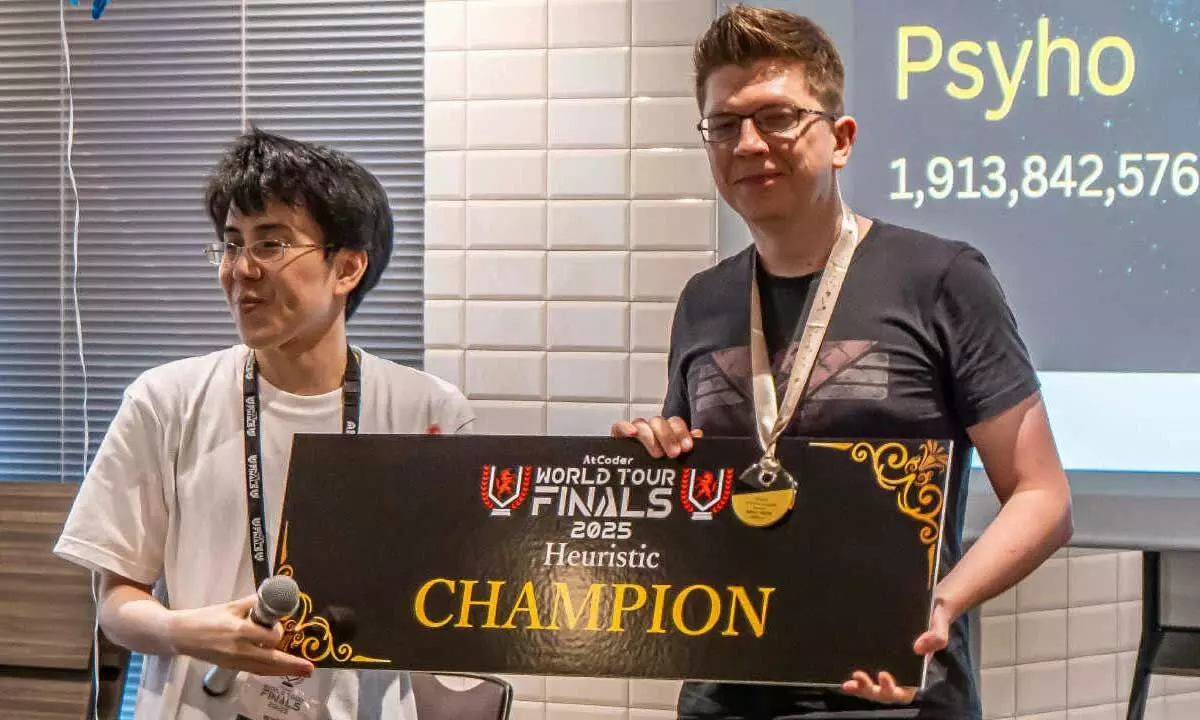Tokyo. A packed hall at the AtCoder World Tour Finals. Twelve elite human coders. One contender none expected: OpenAI’s custom AI agent, OpenAIAHC. And one man ready to risk everything: Przemysław “Psyho” Dębiak, a legendary programmer from Poland.
A Battlefield of Algorithms
Every year, AtCoder hosts its World Tour Finals (AWTF), inviting the top 12 performers in both algorithmic and heuristic contests worldwide. 2025’s twist? OpenAI became the sponsor—and wildcard participant, pitting its AI directly against the circuit’s top human minds in a 10-hour heuristic contest
In this marathon, competitors grapple with a single, fiendishly complex challenge: devise the best solution to navigate 30 robots across a 30×30 grid—an NP-hard optimization puzzle with virtually infinite variables. Because there’s no perfect answer, success hinges on creativity, experimentation, and endurance
Enter the Machine
OpenAI’s unnamed but purpose-built “OpenAIAHC” entered the fray unseen, running the same code editor (Visual Studio Code), same hardware, and same restrictions as its human adversaries . Early on, it surged ahead, using brute-force heuristics to establish a strong lead within the first hour .
Enter Psyho
At hour seven, just as OpenAIAHC felt the competition tightening, Psyho—a four-time TopCoder marathon champion, Xi, Mensa member, and ex-OpenAI Five engineer—reentered the spotlight. By this point, he had had only about 10 hours of sleep over three days but dug deeper, using intuition and ingenuity rather than force .
Turning the Tide
Psyho began applying domain-specific tricks: edge-case detection, adaptive thresholds, pattern recognition—all things AI didn’t pivot toward . He leapfrogged the leaderboard near the 9-hour mark. OpenAIAHC briefly reclaimed first at hour eight—but then, with 46 minutes to go, Psyho played his final hand—and it landed him the lead he needed
Results That Rung the Alarm
- Psyho: 1,812,272,558,909 points
- OpenAIAHC: 1,654,675,725,406 points
- Margin: 9.5%.
Prize money? ¥500,000 (~$3,400) for first place. AI took home ¥200,000
Two Minds, Two Methods
Participants and judges were impressed. Contest organizer Yoichi Iwata remarked OpenAIAHC “excelled at raw optimization” but lacked the creative spark and lateral thinking of Psyho . And Psyho admitted, “I was so close to the model’s score… that pushed me to dig deep. Without it, my score would have been much, much lower” .
OpenAI CEO Sam Altman tweeted simply: “good job psyhp”
The Human Element in Code
This event echoes the 1997 Deep Blue vs Kasparov and 2016 AlphaGo vs Lee Sedol matches—but with a twist. The marathon format allowed human creativity to shine through fatigue. Psyho’s story stands as a modern-day legend: not only John Henry, but his beaten chest—reminding us that creative breakthroughs still outpace circuit boards.
However, data suggests this may be fleeting. The Stanford AI Index reports AI’s success rate on coding benchmarks rocketed from 4.4% in 2023 to 71.7% in 2024 . Meanwhile, tools like GitHub Copilot are now used daily by over 90% of developers .
What Lies Ahead
Psyho’s win shows humans aren’t obsolete—but the tempo of change won’t wait. Expect future events to adopt human-AI hybrid formats, where synergy matters more than competition. Still, for now, the message rings clear: human creativity, intuition, and endurance remain irreplaceable.
In a milestone for the tech world, Polish programmer Przemysław “Psyho” Dębiak triumphed over a purpose-built OpenAI model in the heuristic final of the AtCoder World Tour Finals, held in Tokyo today.
Twelve elite coders competed in a 10-hour optimization marathon, navigating 30 robots through a 30×30 grid—an NP-hard puzzle where perfect solutions are impossible. This year marked the first-ever “Humans vs AI” exhibition in the heuristic track, with OpenAI entering its custom OpenAIAHC under the same rules and hardware
Early in the contest, OpenAIAHC dominated using brute-force heuristics. But by the seventh hour, Psyho seized momentum through inventive, context-aware strategies. With just 46 minutes left, he retook the lead and held on, finishing with 1.81 × 10¹² points—a robust 9.5% margin over the AI’s 1.65 × 10¹²
Psyho, a former OpenAI engineer and four-time TopCoder marathon champ, said he slept only about 10 hours in three days. “I was so tired… but I was very close to the model’s score… that pushed me to dig deep,” he told Business Insider
Event organizer Yoichi Iwata said the AI excelled at optimization but lacked human creativity. OpenAI CEO Sam Altman congratulated Psyho on X: “good job psyho,” while OpenAI’s account added, “Our model took 2nd place… Congrats to the champion for holding us off”
The win underscores that while AI is advancing rapidly—its performance on coding benchmarks jumped from 4.4% to 71.7% in one year—human creativity and endurance remain decisive in complex, open-ended challenges. The contest awarded Psyho ¥500,000, and the AI secured second prize of ¥200,000

